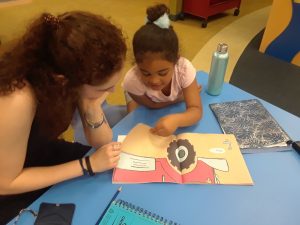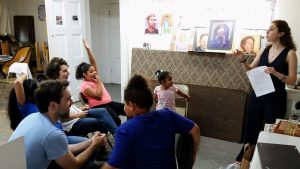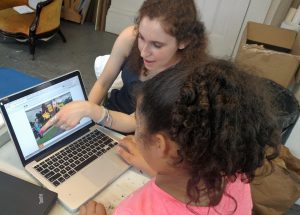Leah Cates, Women’s Studies Major, Creative Writing Minor, Class of 2020
Tom Ellman, Associate Professor of Computer Science
As a Caucasian student at a prestigious college entrusted to work with six children of color from an under-resourced part of Poughkeepsie, I approached this project wary of my potential to inadvertently cause harm. Although I genuinely enjoyed working with the bright children and dedicated staff, my research and reflection on community-engaged learning (CEL) deepened my understanding of its dangers.
The project included three components:
–Barrett Kids Program (BKP) Volunteering: BKP is an art and homework club for 6-10-year-olds, held at the Barrett Art Center (BAC). At BKP, I built close relationships with the children, particularly six-year-old Emma, with whom I read, completed homework and played. I kept a journal of my time with Emma, and wrote analyses of Emma and her sister, Mia’s, behavior and development for their mother.*
–Video-Game: We used Scratch to create two original video games for the kids, whose artwork and collaboration were instrumental in game development. The project encouraged the kids to consider their lives and art in a unique light. On day 1, the kids first played The Barrett Kids Art Supply Quest, which features the kids’ houses, self-portraits and photos of BK staff. Next, they generated ideas and artwork for game 2. I wrote dialogue for and coded game 2, titled Anna & Frida Shop (Anna is the BKP director; Frida is her daughter), which the kids played the following week. The game showcases a narrative developed by the kids, with six levels, each featuring a different child’s work.
–Research & Writing: Throughout the summer, I explored the inherently problematic nature of CEL. My research and reflection culminated in a 15-page essay combining literature with lived experience, as well as a 15-page annotated bibliography. The former discusses CEL’s flaws, including its inability to address structural oppression and tendency to promote the “savior-industrial complex.” Despite my attempts to contribute value to the community, my experience was fraught with CEL pitfalls, including exploitation (e.g., photographs for this write-up), and emotional harm, as Emma became upset when we separated at the program’s end.
In the essay, I ask whether resources spent on non-profits can be put to greater use. Do programs like BK provide cover for government inaction? Do privileged learners/workers alienate populations “served”? Perhaps. Nevertheless, students cannot hide behind intellectual arguments. Of course we didn’t achieve structural change. But the Barrett kids’ creativity and confidence blossomed.
*Emma and Mia are aliases to protect the children’s identities.



